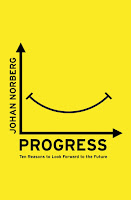Progress: Ten Reasons to Look Forward to the Future

The Swede Johan Norberg has written a book in which he describes how the world has made progress in many areas. The book, titled Progress: Ten Reasons to Look Forward to the Future , has ten chapters in which the following topics are treated: food, sanitation, life expectancy, poverty, violence, the environment, literacy, freedom, equality, and children's rights and perspectives. In his treatment of these topics Norberg uses vivid examples and a lot of objective data. Even if you have read some things about the great progress in the world, you will probably still come across some informative new material in this book. The book is interesting although I have a point of criticism.





